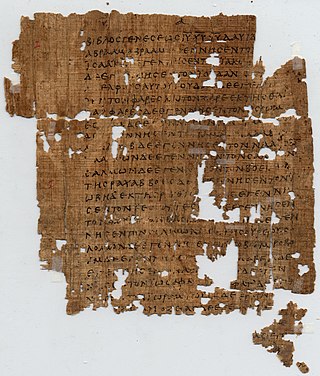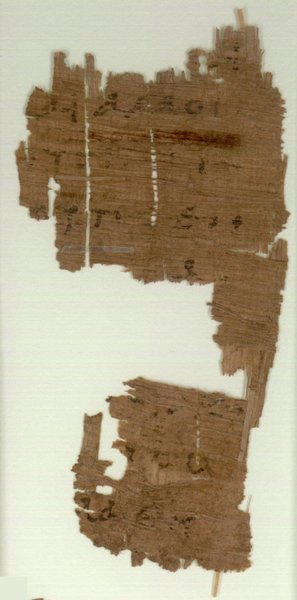
The Codex Bezae Cantabrigiensis, designated by siglum Dea or 05, δ 5, is a bi-lingual Greek and Latin manuscript of the New Testament written in an uncial hand on parchment. It contains most of the four Gospels and Acts, with a small fragment of 3 John. Using the study of comparative writing styles (palaeography), it is currently dated to the 5th century.

In textual criticism of the New Testament, Caesarean text-type is the term proposed by certain scholars to denote a consistent pattern of variant readings that is claimed to be apparent in certain Koine Greek manuscripts of the four Gospels, but which is not found in any of the other commonly recognized New Testament text-types. In particular a common text-type has been proposed to be found: in the ninth/tenth century Codex Koridethi; in Codex Basilensis A. N. IV. 2 ; and in those Gospel quotations found in the third century works of Origen, which were written after he had settled in Caesarea. The early translations of the Gospels in Armenian and Georgian also appear to witness to many of the proposed characteristic Caesarean readings, as do the small group of minuscule manuscripts classed as Family 1 and Family 13. However, some text-critics, such as Kurt and Barbara Aland have disputed the existence of a Caesarean text-type.

Codex Washingtonianus, Codex Washingtonensis or Codex Freerianus, designated by W or 032, ε014, also called the Washington Manuscript of the Gospels, The Freer Gospel and The Freer Codex, is a Greek uncial manuscript of the four Gospels, written on parchment. Using the study of comparative writing styles (palaeography), it has been dated to the 4th or 5th century. The manuscript has some gaps.

Papyrus 1 designated by "𝔓1", "ε 01 ", is an early Greek copy of a papyrus manuscript of one chapter of the Gospel of Matthew dating palaeographically to the early 3rd century. It was discovered in Oxyrhynchus, Egypt. It is currently housed at the University of Pennsylvania Museum.

Codex Regius, designated by siglum Le or 019, ε56, is a Greek uncial manuscript of the New Testament written on parchment. Using the study of comparative writing styles (palaeography), it has been assigned to the 8th century. The manuscript has several gaps. Textual critic Frederick H. A. Scrivener described it as "by far the most remarkable document of its age and class."
Papyrus 19, signed by 𝔓19, is an early copy of the New Testament in Greek. The manuscript paleographically has been assigned to the 4th or 5th century.

Western non-interpolations is a term coined by F. J. A. Hort for certain phrases that are absent in the Western text-type of New Testament manuscripts, but present in one of the two major other text-types. The Alexandrian text-type is generally terse or concise; the Western text-type is larger and paraphrased at places ; the Byzantine text-type is a combination of those two. Nevertheless, the Western text is in certain places shorter than the Alexandrian text. All these shorter readings Hort named Western non-interpolations. Because New Testament scholars have generally preferred the shorter reading – lectio brevior – of textual variants since the 19th century, B. F. Westcott and F. J. A. Hort concluded that these shorter readings in Western manuscripts represented the authentic original Biblical text. When they printed The New Testament in the Original Greek (1882), in almost all cases, it followed the Alexandrian text with the few exceptions that use these Western non-interpolations instead. According to Westcott and Hort, on some rare occasions Western textual witnesses have preserved the original text, against all other witnesses.
Minuscule 892, ε 1016 (Soden). It is a Greek minuscule manuscript of the New Testament, on 353 parchment leaves. It is dated palaeografically to the 9th century.

Papyrus 107, designated by 𝔓107, is a copy of the New Testament in Greek. It is a papyrus manuscript of the Gospel of John, containing verses 17:1-2 & 17:11 in a fragmentary condition. The manuscript has been paleographically assigned to the early 3rd century CE. The manuscript currently is housed at the Sackler Library at Oxford.

Papyrus 109, designated by siglum 𝔓109, is a copy of the New Testament in Greek. It is a papyrus manuscript of the Gospel of John, containing verses 21:18-20 & 21:23-25 in a fragmentary condition. The manuscript has been palaeographically assigned by the INTF to the early 3rd century CE. Papyrologist Philip Comfort dates the manuscript to the middle-late 2nd century CE. The manuscript is currently housed at the Papyrology Rooms of the Sackler Library at Oxford.
Textual variants in the New Testament manuscripts arise when a copyist makes deliberate or inadvertent alterations to the text that is being reproduced. Textual criticism of the New Testament has included study of its textual variants.
The Claremont Profile Method is a method for classifying ancient manuscripts of the Bible. It was elaborated by Ernest Cadman Colwell and his students. Professor Frederik Wisse attempted to establish an accurate and rapid procedure for the classification of the manuscript evidence of any ancient text with large manuscript attestation, and to present an adequate basis for the selection of balanced representatives of the whole tradition. The work of Wisse is limited only to three chapters in Luke: 1, 10, and 20.

Textual variants in the Gospel of Matthew are the subject of the study called textual criticism of the New Testament. Textual variants in manuscripts arise when a copyist makes deliberate or inadvertent alterations to a text that is being reproduced. An abbreviated list of textual variants in this particular book is given in this article below.
Textual variants in the Gospel of Mark are the subject of the study called textual criticism of the New Testament. Textual variants in manuscripts arise when a copyist makes deliberate or inadvertent alterations to a text that is being reproduced. An abbreviated list of textual variants in this particular book is given in this article below.
Textual variants in the Gospel of Luke are the subject of the study called textual criticism of the New Testament. Textual variants in manuscripts arise when a copyist makes deliberate or inadvertent alterations to a text that is being reproduced. An abbreviated list of textual variants in this particular book is given in this article below.
Textual variants in the Gospel of John are the subject of the study called textual criticism of the New Testament. Textual variants in manuscripts arise when a copyist makes deliberate or inadvertent alterations to a text that is being reproduced. An abbreviated list of textual variants in this particular book is given in this article below.
Textual variants in the Acts of the Apostles are the subject of the study called textual criticism of the New Testament. Textual variants in manuscripts arise when a copyist makes deliberate or inadvertent alterations to a text that is being reproduced. An abbreviated list of textual variants in this particular book is given in this article below.
Textual variants in the Epistle to the Romans are the subject of the study called textual criticism of the New Testament. Textual variants in manuscripts arise when a copyist makes deliberate or inadvertent alterations to a text that is being reproduced. An abbreviated list of textual variants in this particular book is given in this article below.
Textual variants in the First Epistle to the Corinthians are the subject of the study called textual criticism of the New Testament. Textual variants in manuscripts arise when a copyist makes deliberate or inadvertent alterations to a text that is being reproduced. An abbreviated list of textual variants in this particular book is given in this article below.
Textual variants in the Epistle of James are the subject of the study called textual criticism of the New Testament. Textual variants in manuscripts arise when a copyist makes deliberate or inadvertent alterations to a text that is being reproduced. An abbreviated list of textual variants in this particular book is given in this article below.





















